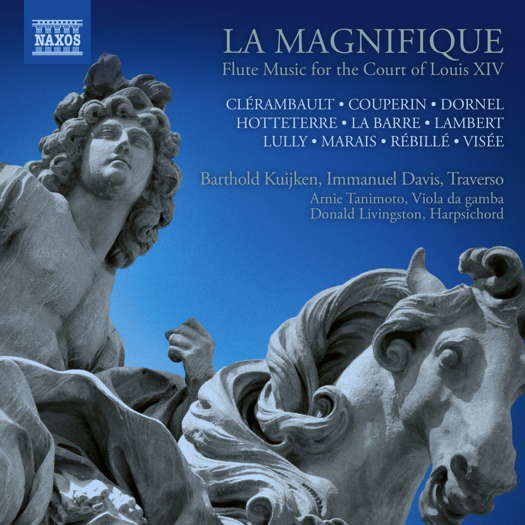- Oehms Classics Musikproduktion GmbH
- Luc Bondy
- Brazilian
- Elena Firsova
- Fryderyk Chopin
- OehmsClassics
- Yonty Solomon
- Lausanne Conservatory
 DISCUSSION: What is a work? John Dante Prevedini leads a discussion about The performing artist as co-creator, including contributions from Halida Dinova, Yekaterina Lebedeva, Béla Hartmann, David Arditti and Stephen Francis Vasta.
DISCUSSION: What is a work? John Dante Prevedini leads a discussion about The performing artist as co-creator, including contributions from Halida Dinova, Yekaterina Lebedeva, Béla Hartmann, David Arditti and Stephen Francis Vasta.
 DISCUSSION: John Dante Prevedini leads a discussion about Music and the Visual World, including contributions from Celia Craig, Halida Dinova and Yekaterina Lebedeva.
DISCUSSION: John Dante Prevedini leads a discussion about Music and the Visual World, including contributions from Celia Craig, Halida Dinova and Yekaterina Lebedeva.

Exquisitely Written
Flute music for Louis XIV's Court, recommended by GERALD FENECH
'This is music full of gentle sensitivity and graceful intimacy, wonderfully performed and recorded, and a veritable treasure trove from the height of the French baroque era.'
The programme on this album relates the story of how the flute in France was born in the late seventeenth century, and the first forty years of its life. It is quite likely that many of the pieces on this issue would have been heard by Louis XIV (1638-1715). Besides being new and fashionable, the flute was then something of a rarity, and this might be the main reason why the King took it so strongly to heart. Louis was a great patron of the arts and a great music lover, but while he was simply bowled over by the spectacle of opera and ballet, he was also a devotee of intimate concerts, and had regular performances in his private apartments by famous flautists and gambists. Many of the elite composers and musicians of the Paris Court had the designation 'ordinaire de la musique de la chambre du Roi', and François Couperin tells us that in 1714-15 he performed almost every Sunday in the King's Salon.
French culture is renowned for its elegance, refinement, delicacy and good taste, and all the pieces on this disc embody these ideals. They are all exquisitely written for the flute, highlighting the instrument's best features, and the sounds of desire and yearning love, among other emotions, are expressed with a mastery that is a delight to experience.
Listen — Jacques Hotteterre: J'Ecoûtois autrefois (Recueil d'airs sérieux et à boire)
(track 13, 0:00-0:50) ℗ 2021 Naxos Rights Europe Ltd :
Life at the King's Court was extremely prescribed, and there were countless rules on conduct for every situation. Inner longings in particular had to be kept under strict control, and even if these were deeply felt inside one's soul, the outer demeanour had to be one of calm and collectiveness. Proper etiquette had to prevail always. This way of life is clearly displayed in the music selected for this programme. On the surface the music sounds very calculated. Many of the movements, ornaments and other musical elements follow specific rules, and on the top layer everything seems pleasing and ideal, but on careful listening, one can behold deep human yearnings lurking beneath.
Listen — Michel de la Barre: Chaconne (Sonate L'Inconnuë)
(track 20, 2:50-3:46) ℗ 2021 Naxos Rights Europe Ltd :
All ten composers featured on this CD, amazingly enough, were alive at some time or another during Louis' reign. Some still enjoy popularity up to our own time. Composers such as Louis-Nicolas Clérambault (1676-1749), Jean-Baptiste Lully (1632-1687), Jacques Hotteterre (1673-1763), François Couperin (1668-1733) and Marin Marais (1656-1728), still have their music performed with a certain regularity.
Listen — Marin Marais: Petite Passacaille (Suite No 2 in G minor)
(track 31, 1:34-2:21) ℗ 2021 Naxos Rights Europe Ltd :
The remainder of the group, Michel Lambert (1610-1696), Philbert Rébillé (1639-1717), Louis Antoine Dornel (circa 1680-1756), Michel de La Barre (1675-1745) and Robert de Visée (1660-1733), although no less gifted, do not command the attention they deserve.
Listen — Robert de Visée: Sarabande (Suite No 9 in E minor)
(track 12, 1:41-2:27) ℗ 2021 Naxos Rights Europe Ltd :
This is music full of gentle sensitivity and graceful intimacy, wonderfully performed and recorded, and a veritable treasure trove from the height of the French baroque era. Annotations and presentation are first-rate.
Copyright © 5 March 2021
Gerald Fenech,
Gzira, Malta



